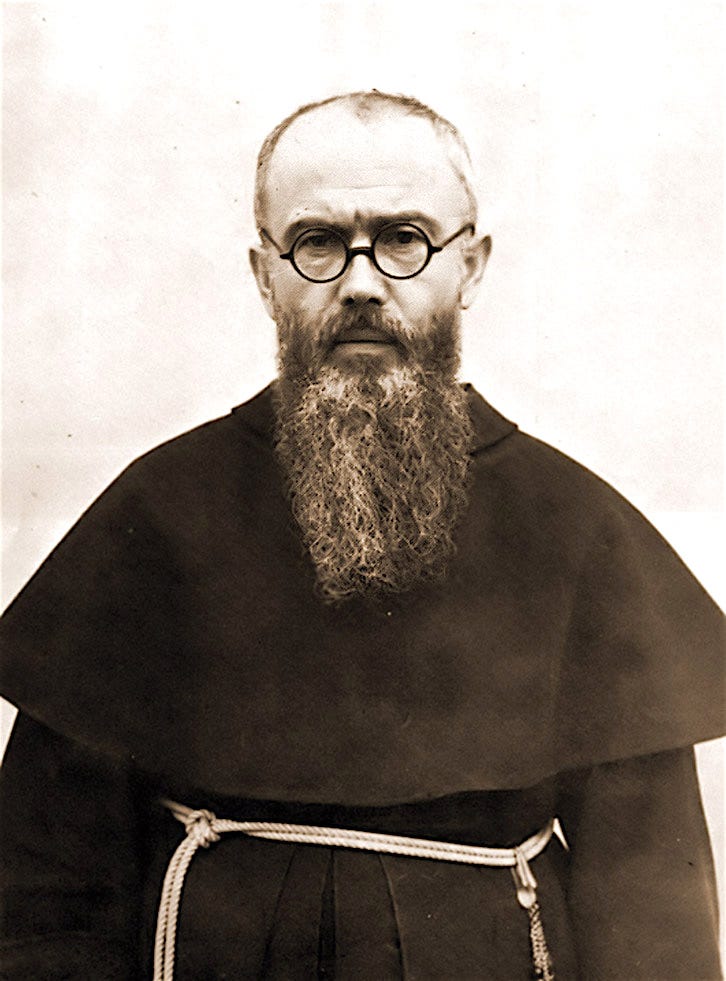Photo: Unknown author, Wikimedia Commons
The Glory of the Lord is higher than the skies - Psalm 113:4
St. Maximilian Kolbe: Martyr of Charity
Today the Church remembers St. Maximilian Kolbe, Martyr of Charity, who died at Auschwitz on August 14th, 1941. Ten prisoners were condemned to death by starvation, after it was learned that a prisoner had escaped. St. Maximilian offered to die in place of a Polish army sergeant. After two weeks in the starvation bunker, St. Maximilian was put to death by lethal injection when the Nazis needed to make room for other prisoners.
A large number of brief articles, his correspondence, as well as his notebooks containing personal thoughts and reflections survive. [1] His writings lead us to reflect upon the importance of several things:
the Eucharist in the life of the Church;
devotion to Mary the Mother of God, with a focus on the mystery of the Immaculate Conception,
and the importance of Prayer and the renewing power of the Holy Spirit in our daily struggles as Christians.
The Eucharist, Mary, and Prayer.
Biographical accounts emphasize St. Maximilian’s great love for, and devotion to Jesus in the Sacrament of the Eucharist. This was evident in his lengthy preparations for Mass, the importance he attached to thanksgiving after Mass, and his devotion to Our Lord in holy hours of Eucharistic Adoration, and his frequent visits to the chapel.
From St. Maximilian’s own notes, we get some idea of his views on the transforming power of the Eucharist when he states that:
The Divine Office and the Mass, celebrated well, can renew an entire diocese.
Elsewhere he states:
One Communion alone can make us Saints, and can affect the conversion of many people. But all depends on our interior dispositions, and on our preparation.
St. Maximilian reminds us of the importance of remaining close to the Eucharist in our own prayer lives individually and collectively.
For as Jesus tells us in today’s Gospel:
Where two or three are gathered in my Name, I Am there among them (Matt. 18:20).
And so, how do we prepare for our encounter with the Lord in the Eucharist?
Have we gone to confession?
Have we spent some time in silent prayer?
Are we in the regular habit of praying to Jesus in Eucharistic Adoration?
St. Maximilian & Marian Consecration
Secondly, St. Maximilian was a great promoter of devotion to Our Lady, and to this end founded the worldwide evangelization movement known as the Militia of the Immaculata, or Knights of the Immaculate, in 1917. In it he called people to entrust themselves or “to consecrate” themselves “To Jesus through Mary,” (Per Mariam ad Iesum).
As a seminarian, St. Maximilian had witnessed a profane demonstration against the Church. And again, this inspired him to found a movement by which individuals would consecrate themselves to Mary and so become God’s instruments in the great spiritual struggle against the forces of evil described by St. John in chapter 12 of the Book of Revelation.
At the heart of the movement is consecration to Mary, the promise to wear the Miraculous Medal, and the short prayer:
O Mary conceived without sin pray for us who have recourse to you, and for all who do not have recourse to you especially the enemies of the Church and all those recommended to you.
Central to his focus on Our Lady was the mystery of the Immaculate Conception, which is how she referred to herself when she appeared to St. Bernadette at Lourdes in 1858. In the mystery of the Immaculate Conception, the Church teaches that from the very beginning of her human existence, Mary, “the New Eve,” was in a state of grace, sharing in God’s own life, and that she was free from the sinful inclinations which have beset human nature after the fall.
The mystery of the Immaculate Conception speaks to us of God’s power to bring forth a new creation, and of God’s renewing, life-giving graces at work in the midst of humanity’s fallen condition.
“The Future of the World Depends Upon Hands Raised in Prayer”
Finally, St. Maximilian reminds us of the great importance of prayer. Concerning prayer he says: ‘Our influence in the world, “in the natural order depends upon our position, upon work, abilities, circumstances,” and other things. But “in the supernatural order, we can influence without measure,” precisely through prayer, so that:
The future of the world depends upon hands raised in prayer.
To those who are teachers, and for those of us who are students, he offers the following:
The knees, not the intellect or the pen, give efficacy to action. . . . Prayer before and prayer after every activity.
Let us pray that through the intercession of St. Maximilian, we may be signs of joy and hope to those around us.
Let us pray for an end to wars and violence in the world, that people may turn away from hostility and live in peace and harmony with one another.
Let us pray for the intercession of Mary the Mother of God for the grace to bring forth Christ in our lives, and into the world through our prayer, a renewed commitment to growth in the spiritual life, and through the witness that we give to the Gospel through our words and works of charity.
I invite you to view the National Catholic Broadcasting Council’s Daily TV Mass below. The Homily begins at 7:31:





Number 16670 dared to step from the line.
“I would like to take that man’s place. He has a wife and children.”
“Who are you?”
“A priest.”
Pastoral is given meaning in the act of giving up one's life for a family. Retell of # 16670, not just a number!